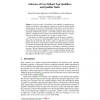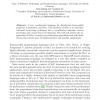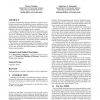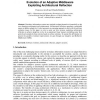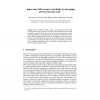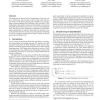130
click to vote
ESOP
2006
Springer
15 years 5 months ago
2006
Springer
Abstract. In previous work, we described a new approach to supporting userdefined type qualifiers, which augment existing types to specify and check additional properties of intere...
141
click to vote
ESOP
2006
Springer
15 years 5 months ago
2006
Springer
We present a sound and complete proof technique, based on syntactic logical relations, for showing contextual equivalence of expressions in a -calculus with recursive types and imp...
120
click to vote
ESOP
2006
Springer
15 years 5 months ago
2006
Springer
We present a multi-lingual type inference system for checking type safety of programs that use the Java Native Interface (JNI). The JNI uses specially-formatted strings to represe...
135
click to vote
ERSHOV
2006
Springer
15 years 5 months ago
2006
Springer
A new coordination language for distributed data-parallel programs is presented, call SNet. The intention of SNet is to introduce advanced structuring techniques into a coordinatio...
143
click to vote
EMSOFT
2006
Springer
15 years 5 months ago
2006
Springer
Concurrent programming languages should be a good fit for embedded systems because they match the intrinsic parallelism of their architectures and environments. Unfortunately, typ...
108
click to vote
ECOOP
2006
Springer
15 years 5 months ago
2006
Springer
: Nowadays information systems are required to adapt themselves dynamically to the ever changing environment and requirements. Architectural reflection represents a principled mean...
137
click to vote
ECOOP
2006
Springer
15 years 5 months ago
2006
Springer
Abstract. Generic types in C behave invariantly with respect to subtyping. We propose a system of type-safe variance for C that supports the declaration of covariant and contravari...
135
click to vote
ECOOP
2006
Springer
15 years 5 months ago
2006
Springer
This paper briefly describes the design of a dynamic adaptation management framework exploiting the concepts provided by Aspect-Oriented Software Development (AOSD) -in particular ...
ECOOP
2006
Springer
15 years 5 months ago
2006
Springer
The evolvability of AOP systems is severely affected by the tight coupling between aspects and base code. This paper identifies the advice fragility problem, originated in the need...
118
click to vote
ECOOP
2006
Springer
15 years 5 months ago
2006
Springer
The integration of aspects into the methodology of stepwise software development and evolution is still an open issue. This paper focuses on the global quantification mechanism of...
